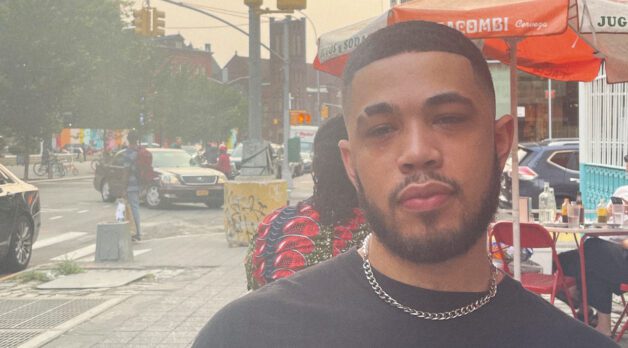Wes Goodrich
 Wes Goodrich
Wes Goodrich

At the start of the 1970-set Palm Sunday, writer-director Wes Andre Goodrich’s mordantly ironic parable of cultural assimilation, Jimmy, a young Black Jamaican immigrant, is struck by a vision while attending a Black Southern church. He sees himself surrounded by an all-white congregation; their hands laid across him, he breaks into a beatific smile. Moments later, he visits the church’s pastor and announces his plan to join the all-white Baptist church nearby. The pastor is critical, unbelieving that the white church will take in this new congregant. “They’ll accept me if it’s God’s will,” Jimmy replies.
Over the course of a taut 15 minutes, Palm Sunday, Goodrich’s Columbia University film school thesis short, subtly makes sense of Jimmy’s journey, which is about something other than breaking a barrier of racial equality. Goodrich says of the short’s original script, a true story brought to him by producing partner Patrick Nichols, that “it was very much about the white church—them being like, ‘We want to be good, but we’re not.’ It was more interesting for me to know what was going on with this guy psychologically.” Over a year of development, Goodrich seized on the fact that the real-life character was a Jamaican immigrant. Conversations with his Jamaica-born mother provided guidance, as did watching Sidney Poitier’s performance in In the Heat of the Night. About Jimmy, Goodrich says, “He’s Black, but he’s an immigrant, and maybe he wants what all Americans theoretically want, which is the American dream. In this context, for this guy, we decided that that means trying to assimilate into this white culture.”
Palm Sunday, which will be in competition at the New Orleans Film Festival, New Hampshire Film Festival and Calgary International Film Festival, is one of two Goodrich shorts making the rounds. Its difference from the other, Speak Up Brotha! (which played at Cleveland International Film Festival, the American Black Film Festival and Dances with Films LA, among others), points to the way Goodrich and producer Nichols approach project development, which involves “always figuring out where the movie fits in a lineage of movies and then trying to riff.” For Palm Sunday, that meant drawing from “Ganja and Hess, Melvin Van Peebles and blaxploitation,” whereas for Speak Up Brotha!, the story of a tongue-tied rideshare driver crushing on a beautiful performance poet, the vibe was more “Love Jones, Love & Basketball and Atlanta.” The short began when producer Cameron Carr connected with start-up Black Man Films, which presented the original script. Again, Goodrich found a way into the material, this time foregrounding issues around mental health. “We don’t see a lot of movies with Black men struggling with themselves in a practical way,” he says. “So, it was important that the filmic language took on [the protagonist’s] anxiety. When he’s anxious, the film almost begins to jitter. When he gets into this club, it becomes like Love Jones. We were using spherical lenses, and then when we get to the club it’s anamorphic, and the whole movie stretches out.”
Experimenting with camera movement and cinematic style is especially important to Goodrich, who comes to film from a theater background. When he was 10, growing up in East Flatbush, Brooklyn, his stepfather, an English and theater teacher, put him in a school production of A Raisin in the Sun. After attending Edward R. Murrow theater high school, he studied theater directing and political science at Pace University. At Columbia, he says, “There was a bit of, ‘Oh, the theater kid’ stigma in my first year. And maybe my early shorts were a bit more stagey, a bit more dialogue-y, but I always say, ‘My stepdad is Haitian, and my Caribbean upbringing is a big part of my work. And [the difference between] theater and film is kind of like French and Haitian Creole.’”
Because of the pandemic’s limitation on production, Goodrich studied TV writing at Columbia, where he developed the pilot for the series he’s shopping, Heretics, which won him a spot in the 2022 Diverso’s Black Writers in Focus Lab. “It’s a murder mystery inspired by my being a janitor at a megachurch throughout college,” he says. He’s also working on a feature version of Palm Sunday, which jumps from the 1970-set story told in the short to the late ’80s. “It starts out like a racial reconciliation thing, like Guess Who’s Coming to Dinner,” Goodrich explains, “but as it goes on it becomes something darker, like Ganja and Hess.”
“A lot of what I write is either horror or genre adjacent,” Goodrich concludes, “because I think, in a lot of ways, those are the only genres where you can really talk about identity and this country and the way [people like] my parents came here and had to assimilate in some kind of way to American-ness.”—Scott Macaulay/Image: Christabel Duah
